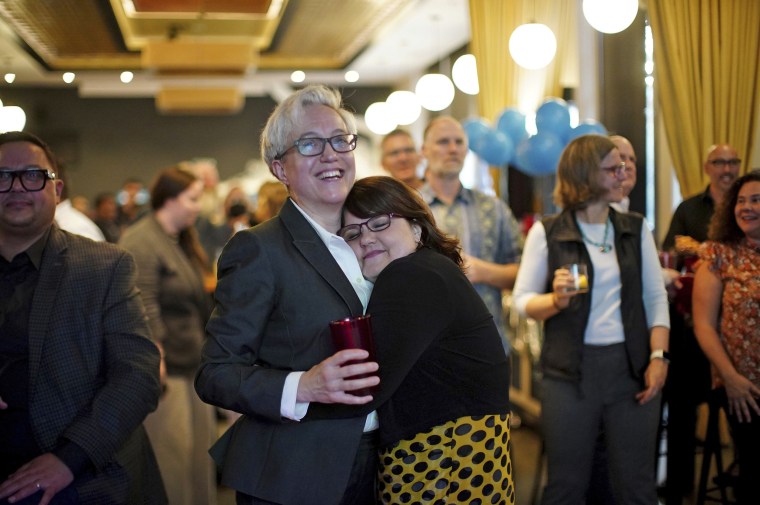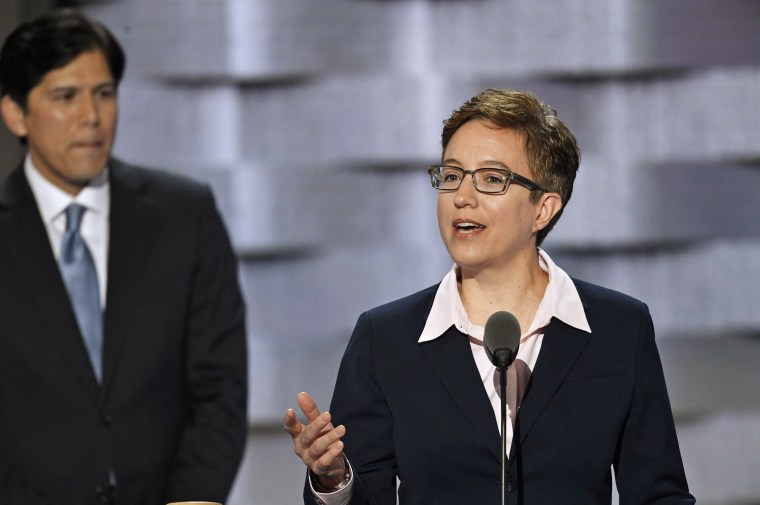The former Oregon House speaker won the state’s Democratic primary, though she’ll face headwinds in November as Republicans eye the governor’s mansion.

Democratic gubernatorial candidate Tina Kotek, left, is embraced by her wife, Aimee Kotek Wilson, during a primary election party at Revolution Hall in Portland, Ore., on May 17.
Beth Nakamura / The Oregonian via AP
May 30, 2022
By Matt Lavietes
Tina Kotek is hoping to make political history again. She became the country’s first out lesbian speaker of a state House of Representatives in 2013. She broke barriers once again by becoming Oregon’s longest-serving speaker, before stepping down in January to run for governor.
Now, after winning the state’s Democratic nomination for governor last week, Kotek hopes to add another notch to her political belt by becoming the first lesbian governor in the United States.
“It’s not why I’m running,” Kotek, 55, said. “But I also know that it can create inspiration for other young people to be like, ‘Look, life can get better. I can do whatever I want, because look at this person or that person.’ So, it’d be an honor.”
May 30, 2022
By Matt Lavietes
Tina Kotek is hoping to make political history again. She became the country’s first out lesbian speaker of a state House of Representatives in 2013. She broke barriers once again by becoming Oregon’s longest-serving speaker, before stepping down in January to run for governor.
Now, after winning the state’s Democratic nomination for governor last week, Kotek hopes to add another notch to her political belt by becoming the first lesbian governor in the United States.
“It’s not why I’m running,” Kotek, 55, said. “But I also know that it can create inspiration for other young people to be like, ‘Look, life can get better. I can do whatever I want, because look at this person or that person.’ So, it’d be an honor.”

Oregon Rep. Tina Kotek speaks at the Democratic National Convention in Philadelphia in 2016.
David Paul Morris / Bloomberg via Getty Images
To achieve that, she’ll have to get past Republican Christine Drazan, the former minority leader of the Oregon House, in November’s open general election. And amid the tough current national environment for Democrats, Republicans are eyeing the Oregon governor’s mansion as an opportunity to score a win in a solidly blue state.If elected, Kotek would follow three other LGBTQ Democrats who have headed a state government: former New Jersey Gov. Jim McGreevey, who came out as gay during his resignation speech in 2004; Colorado Gov. Jared Polis, who is gay; and Oregon Gov. Kate Brown, who is bisexual.
Kotek was born and raised in York, Pennsylvania, and made her way west in 1987 to attend the University of Oregon, where she earned a bachelor’s degree in religious studies. She then went to the University of Washington to pursue her master’s degree in comparative religion and international studies.
Kotek, who is Roman Catholic, said that while many religious institutions have rejected LGBTQ people, religious teachings — at least the way she interprets them — have always played an important role in her life.
“I think God has said, ‘People are who they are. I’ve made them that way. Let’s support and celebrate people in their authentic selves,’” she said. “That’s what I believe in, and I think that’s what a lot of people believe. I know a lot of Oregon voters believe that.”
As she learned about different religions as a student, Kotek also had another spiritual awakening of a different sort: She came out as a lesbian. Like her learnings about religion, Kotek said that her coming out experience has equally shaped her success and political style.
“When you’re coming out, you have to build a resilience of dealing with people who treat you differently for who you are, and that has made me a stronger person,” Kotek said. “It’s also made me open to saying, ‘Look, I want to understand where you’re coming from and let’s have a conversation.’”
“I’ll talk to anybody,” she added. “Because at the end of the day, we’re all human beings.”
After graduate school, Kotek returned to Oregon to work in public policy for various nonprofits. In 2007, she was elected to the state’s House of Representatives.
If elected governor, Kotek said she intends to use her bully pulpit to fight back against the historic number of anti-LGBTQ bills circulating in state legislatures throughout the country.
More than 320 anti-LGBTQ bills have been introduced in state legislatures this year, according to the Human Rights Campaign, the nation’s largest LGBTQ advocacy group. Many of the bills aim to limit the instruction of LGBTQ issues in schools, trans youths’ ability to participate in school sports and trans youths’ access to gender-affirming medical care. The Oregon Legislature, however, is not currently considering any such bills, according to HRC.
“It’s hard when you’re young,” Kotek said. “You’re trying to figure out who you are, and to have people coming after you, feeling like you can’t be your authentic self right now, that’s hurtful. It’s damaging for LGBTQ youths, who have a higher degree of suicidality, and it’s dangerous.”
Kotek added that she believes the problems that the slate of legislation aims to solve are “manufactured” to distract Americans from more pressing issues such as health care costs and inflation.
“Picking on a couple of trans kids who want to be their authentic self and play sports? Is that really the issue that we need to be focusing on in this country?” Kotek asked. “I don’t think so.”
In recent weeks, the LGBTQ community has also been rattled that some of their federal rights may be stripped away by the Supreme Court after a leaked draft majority opinion this month showed the court plans to overturn Roe v. Wade, the landmark abortion rights decision. Politico originally reported the leaked draft of the court’s opinion, which sent political shockwaves across the nation.
Kotek said that if elected, she would “look into” modifying Oregon’s Constitution to protect same-sex marriage, which the Supreme Court legalized nationwide in a landmark ruling in 2015.
“We’re in that kind of moment where people want to push back, whether it’s because of raw politics or fear,” Kotek said. “What I would say is, let’s have dialogue, let’s work through it, let’s keep moving forward.”
“That’s why I consider myself a progressive,” she added. “We can always make the world better, we can always move forward.”
To achieve that, she’ll have to get past Republican Christine Drazan, the former minority leader of the Oregon House, in November’s open general election. And amid the tough current national environment for Democrats, Republicans are eyeing the Oregon governor’s mansion as an opportunity to score a win in a solidly blue state.If elected, Kotek would follow three other LGBTQ Democrats who have headed a state government: former New Jersey Gov. Jim McGreevey, who came out as gay during his resignation speech in 2004; Colorado Gov. Jared Polis, who is gay; and Oregon Gov. Kate Brown, who is bisexual.
Kotek was born and raised in York, Pennsylvania, and made her way west in 1987 to attend the University of Oregon, where she earned a bachelor’s degree in religious studies. She then went to the University of Washington to pursue her master’s degree in comparative religion and international studies.
Kotek, who is Roman Catholic, said that while many religious institutions have rejected LGBTQ people, religious teachings — at least the way she interprets them — have always played an important role in her life.
“I think God has said, ‘People are who they are. I’ve made them that way. Let’s support and celebrate people in their authentic selves,’” she said. “That’s what I believe in, and I think that’s what a lot of people believe. I know a lot of Oregon voters believe that.”
As she learned about different religions as a student, Kotek also had another spiritual awakening of a different sort: She came out as a lesbian. Like her learnings about religion, Kotek said that her coming out experience has equally shaped her success and political style.
“When you’re coming out, you have to build a resilience of dealing with people who treat you differently for who you are, and that has made me a stronger person,” Kotek said. “It’s also made me open to saying, ‘Look, I want to understand where you’re coming from and let’s have a conversation.’”
“I’ll talk to anybody,” she added. “Because at the end of the day, we’re all human beings.”
After graduate school, Kotek returned to Oregon to work in public policy for various nonprofits. In 2007, she was elected to the state’s House of Representatives.
If elected governor, Kotek said she intends to use her bully pulpit to fight back against the historic number of anti-LGBTQ bills circulating in state legislatures throughout the country.
More than 320 anti-LGBTQ bills have been introduced in state legislatures this year, according to the Human Rights Campaign, the nation’s largest LGBTQ advocacy group. Many of the bills aim to limit the instruction of LGBTQ issues in schools, trans youths’ ability to participate in school sports and trans youths’ access to gender-affirming medical care. The Oregon Legislature, however, is not currently considering any such bills, according to HRC.
“It’s hard when you’re young,” Kotek said. “You’re trying to figure out who you are, and to have people coming after you, feeling like you can’t be your authentic self right now, that’s hurtful. It’s damaging for LGBTQ youths, who have a higher degree of suicidality, and it’s dangerous.”
Kotek added that she believes the problems that the slate of legislation aims to solve are “manufactured” to distract Americans from more pressing issues such as health care costs and inflation.
“Picking on a couple of trans kids who want to be their authentic self and play sports? Is that really the issue that we need to be focusing on in this country?” Kotek asked. “I don’t think so.”
In recent weeks, the LGBTQ community has also been rattled that some of their federal rights may be stripped away by the Supreme Court after a leaked draft majority opinion this month showed the court plans to overturn Roe v. Wade, the landmark abortion rights decision. Politico originally reported the leaked draft of the court’s opinion, which sent political shockwaves across the nation.
Kotek said that if elected, she would “look into” modifying Oregon’s Constitution to protect same-sex marriage, which the Supreme Court legalized nationwide in a landmark ruling in 2015.
“We’re in that kind of moment where people want to push back, whether it’s because of raw politics or fear,” Kotek said. “What I would say is, let’s have dialogue, let’s work through it, let’s keep moving forward.”
“That’s why I consider myself a progressive,” she added. “We can always make the world better, we can always move forward.”
No comments:
Post a Comment